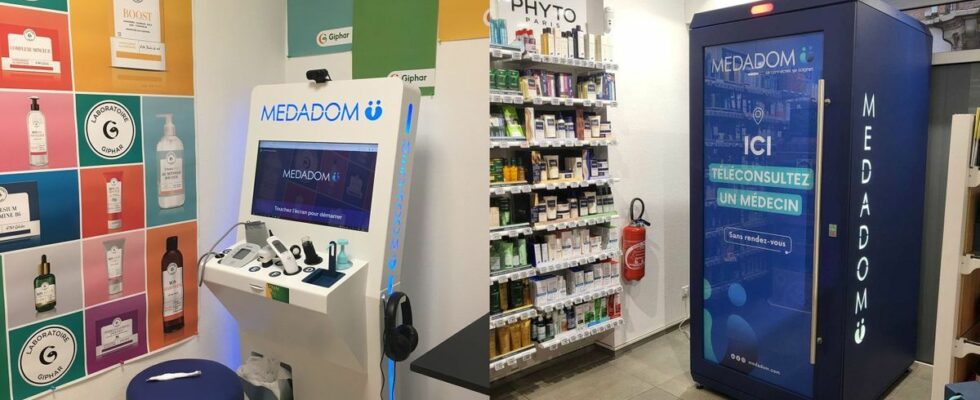Published on
Updated
Reading 3 min.
“In the absence of having had an appointment” with her GP for her son who has had a fever for three days, Christelle came out “quite amazed” from her first teleconsultation in the cabin. A service sold as one of the means to alleviate medical desertification.
“It’s well explained and I was well supported: the doctor guided me remotely to use the oximeter (a small medical device, Editor’s note) and to look inside the ears with the otoscope.“, says the mother in the Arcanes pharmacy, in Val-de-Rueil, a town of some 13,000 inhabitants in Eure.
“It’s also reassuring to have a health professional nearby.“, she says towards the pharmacist to whom she presents the prescription issued by the machine.
The pharmacy has paid 450 euros per month since mid-October to rent this cabin, installed near the counter by the Tessan company, one of the main players in the market which equips a thousand pharmacies in France.
In the cabin, a range of connected instruments, activated remotely: blood pressure monitor, oximeter, dermatoscope, stetoscope and thermometer.
“I had requests every day. Last summer, two doctors left the town and those who remain are overwhelmed“, explains to AFP the pharmacist, Pierre Peltier, whose cabin is listed on the online medical appointment booking platform Doctolib.
Since the installation of the system, the pharmacy has gone from one to two teleconsultations per month, to “between 40 and 50” From now on.
In Eure, the median time to obtain an appointment with a general practitioner is six or seven days, according to 2023 statistics from Doctolib.
The service allows “to avoid emergencies for an ear infection or sore throat” and provides “visibility” to the pharmacy: “Half of the people who come for the teleconsultation are not part of the loyal clientele“, adds the pharmacist.
Distrust of doctors’ unions
He benefited from the Health Insurance package (1,225 euros) to equip himself, to which is added a fixed remuneration, also from Social Security, which varies depending on the number of consultations and is capped at 750 euros per year.
Among private doctors, teleconsultation arouses distrust, even hostility: they fear a disembodied, off-ground medicine that would replace local medicine. And the new prices that they have negotiated with Health Insurance provide for a teleconsultation at 25 euros, for the next five years, compared to 30 euros for face-to-face consultations.
To date, the 6,000 cabins present in France – almost three times more than in 2022 – are installed at “85% in pharmacies because they generally have a confidential room for orthopedics, vaccinations, etc.“, according to the Association of Telehealth Companies (LET).
“We respond to a social problem of access to care“, declares Elie-Dan Mimouni, doctor and co-founder of Medadom, leader in France ahead of Tessan and H4D, with 4,000 cabins or terminals installed. “Our objective is not to be THE solution to the problem of medical deserts, but to be one solution among others“.
The cabins “make it possible to restore medical time in the territories, but also to cultivate complementarity between health professionals“, since the cabins are currently installed, most of the time, in pharmacies, he believes.
A market that remains to be conquered
With today 200,000 teleconsultations claimed per month, Medadom is seeking to develop on new sites, such as nursing offices, or among opticians, with the development of an ophthalmological activity.
Tessan, which works with some 200 employed doctors, has also begun to diversify, with less bulky formats such as consoles and terminals on wheels, tele-ophthalmology and audiology tables or even cases for home nurses.
Its founder, Jordan Cohen, is banking on “other opportunities”. He scrutinizes the calls for tenders from local authorities and reflects on “the installation of cabins in hospital emergency rooms or in occupational medicine“.
The economic model of this market, launched about five years ago, is “complex in terms of furniture, technology, recruitment of doctors and on the regulatory level“, he notes.
Some have broken their teeth, like Visiomed, which sold its activities in France.
